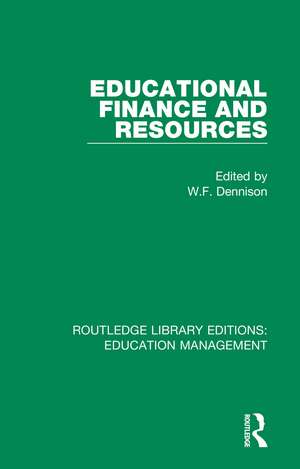Educational Finance and Resources: Routledge Library Editions: Education Management
Editat de W. F. Dennisonen Limba Engleză Paperback – 29 oct 2019
| Toate formatele și edițiile | Preț | Express |
|---|---|---|
| Paperback (1) | 140.10 lei 43-57 zile | |
| Taylor & Francis – 29 oct 2019 | 140.10 lei 43-57 zile | |
| Hardback (1) | 782.44 lei 43-57 zile | |
| Taylor & Francis – 10 mai 2018 | 782.44 lei 43-57 zile |
Din seria Routledge Library Editions: Education Management
- 34%
 Preț: 5858.02 lei
Preț: 5858.02 lei - 15%
 Preț: 207.96 lei
Preț: 207.96 lei -
 Preț: 309.69 lei
Preț: 309.69 lei - 17%
 Preț: 142.32 lei
Preț: 142.32 lei - 17%
 Preț: 94.99 lei
Preț: 94.99 lei - 17%
 Preț: 142.32 lei
Preț: 142.32 lei - 16%
 Preț: 216.07 lei
Preț: 216.07 lei - 17%
 Preț: 142.32 lei
Preț: 142.32 lei - 16%
 Preț: 203.75 lei
Preț: 203.75 lei - 15%
 Preț: 209.80 lei
Preț: 209.80 lei - 17%
 Preț: 142.32 lei
Preț: 142.32 lei - 16%
 Preț: 203.46 lei
Preț: 203.46 lei - 17%
 Preț: 142.32 lei
Preț: 142.32 lei - 17%
 Preț: 142.32 lei
Preț: 142.32 lei - 15%
 Preț: 99.88 lei
Preț: 99.88 lei - 17%
 Preț: 142.32 lei
Preț: 142.32 lei - 16%
 Preț: 216.16 lei
Preț: 216.16 lei - 18%
 Preț: 139.29 lei
Preț: 139.29 lei - 17%
 Preț: 215.71 lei
Preț: 215.71 lei - 17%
 Preț: 96.51 lei
Preț: 96.51 lei - 15%
 Preț: 209.80 lei
Preț: 209.80 lei - 16%
 Preț: 216.07 lei
Preț: 216.07 lei - 15%
 Preț: 209.80 lei
Preț: 209.80 lei - 16%
 Preț: 144.02 lei
Preț: 144.02 lei
Preț: 140.10 lei
Preț vechi: 169.32 lei
-17% Nou
Puncte Express: 210
Preț estimativ în valută:
26.81€ • 28.06$ • 22.18£
26.81€ • 28.06$ • 22.18£
Carte tipărită la comandă
Livrare economică 07-21 aprilie
Preluare comenzi: 021 569.72.76
Specificații
ISBN-13: 9781138545359
ISBN-10: 113854535X
Pagini: 284
Dimensiuni: 138 x 216 x 17 mm
Greutate: 0.34 kg
Ediția:1
Editura: Taylor & Francis
Colecția Routledge
Seria Routledge Library Editions: Education Management
Locul publicării:Oxford, United Kingdom
ISBN-10: 113854535X
Pagini: 284
Dimensiuni: 138 x 216 x 17 mm
Greutate: 0.34 kg
Ediția:1
Editura: Taylor & Francis
Colecția Routledge
Seria Routledge Library Editions: Education Management
Locul publicării:Oxford, United Kingdom
Public țintă
Postgraduate, Professional, and UndergraduateCuprins
1. The Costs of Education 2. Education and Economy 3. Distributing Resources 4. Resources and The Curriculum 5. Teachers as a Resource 6. Resources, Planning and The Institutions 7. Contraction, Privatisation and Other Choices
Descriere
Originally published in 1984. This book explains, analyses and criticises the complexities of the financial decision-making systems in education. It discusses the role of the different bodies and people involved and explores the thinking and conventions which shape their findings.
